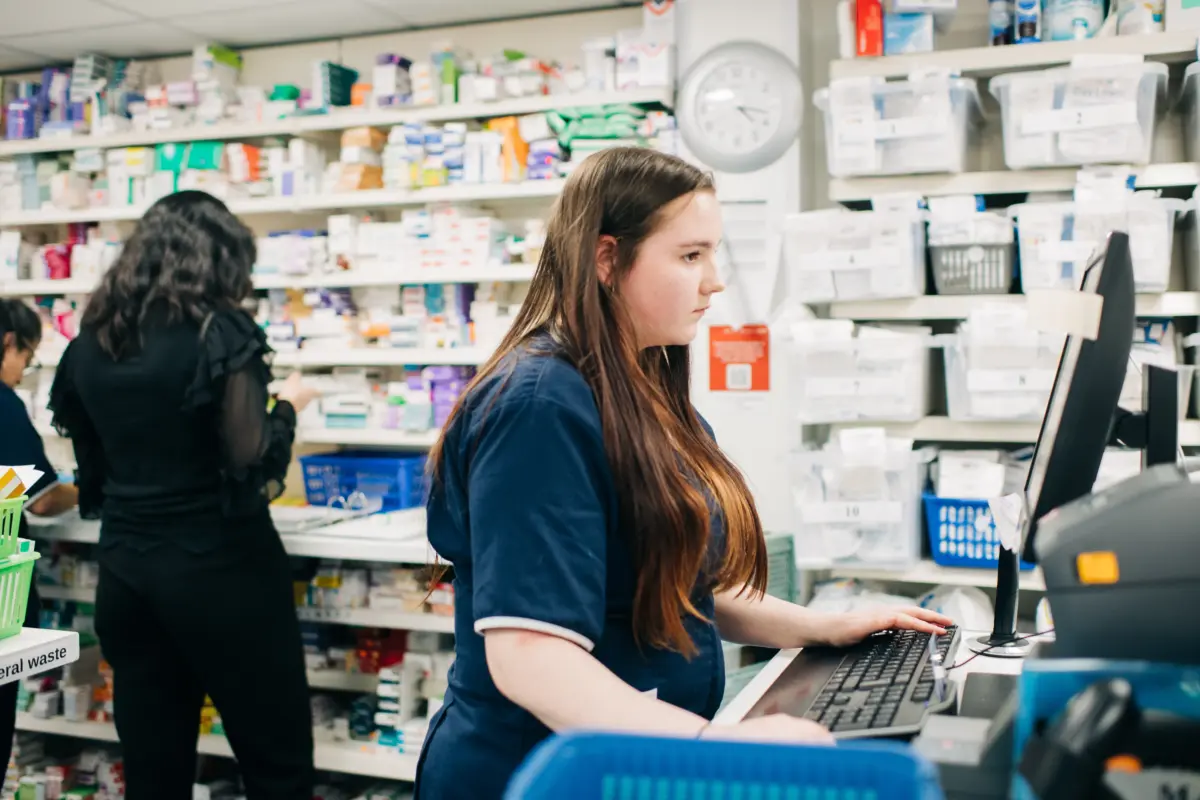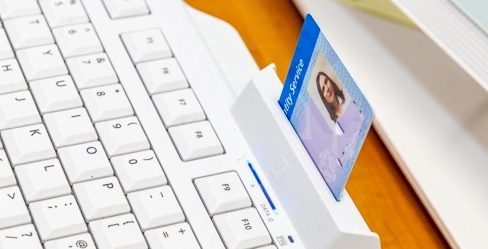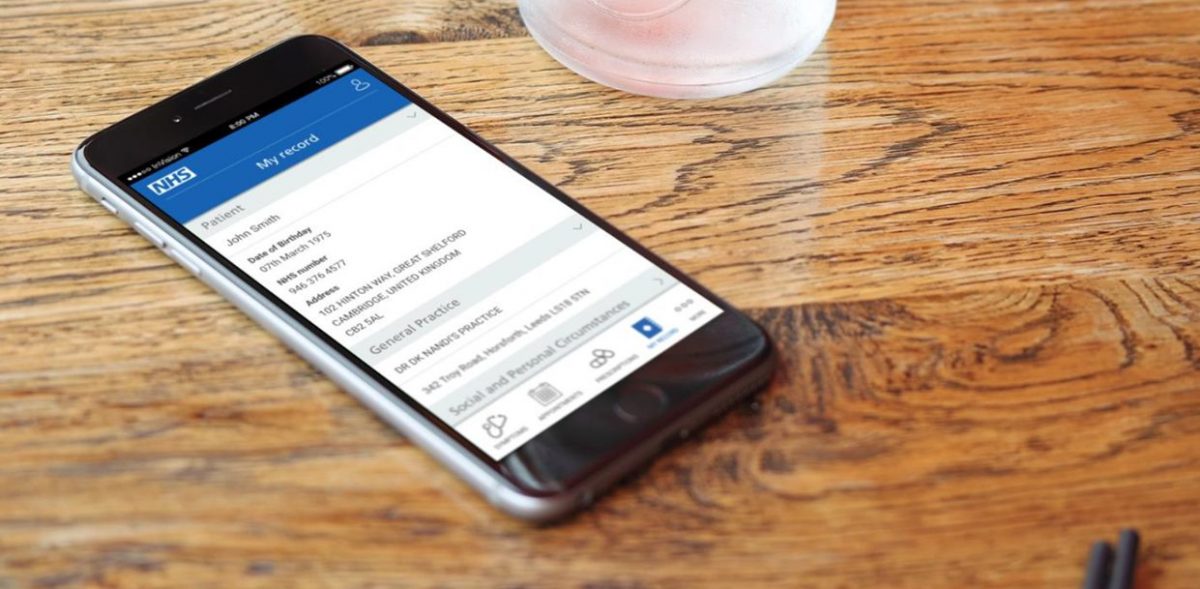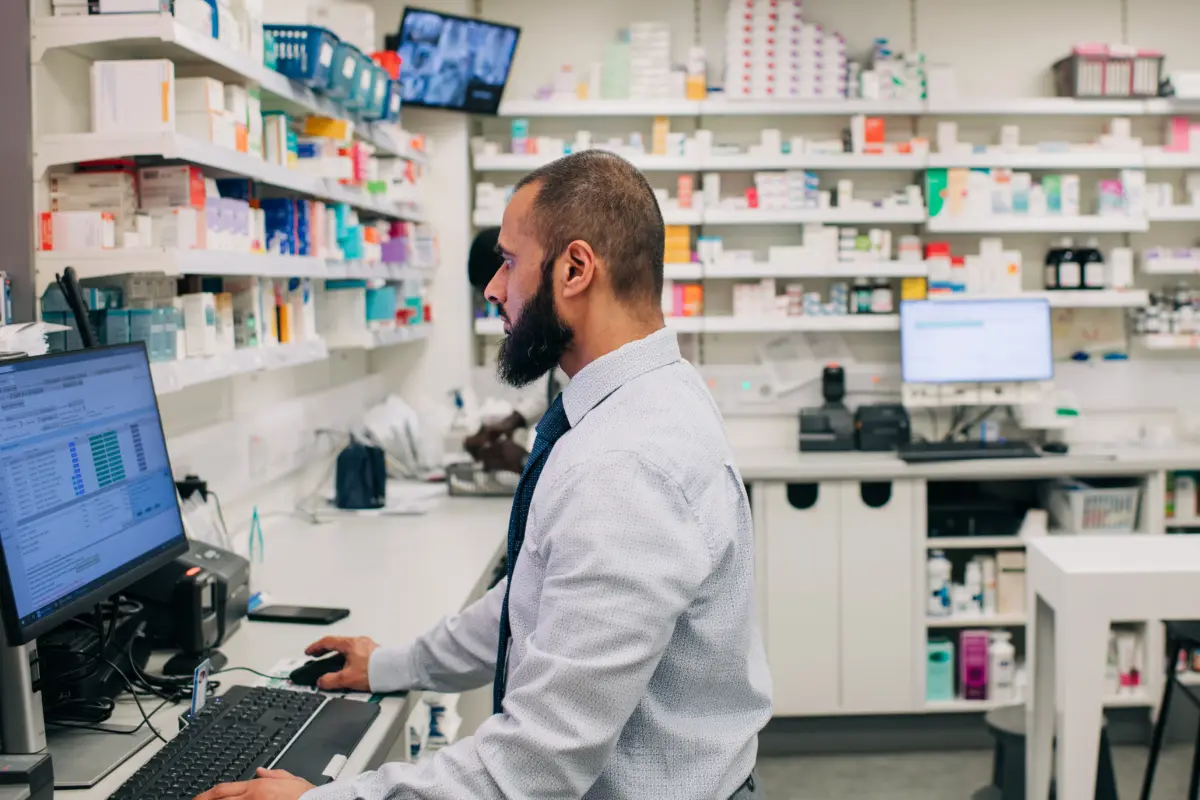Apps
Published on: 27th January 2017 | Updated on: 16th November 2023
Apps are software applications, usually designed to run on smartphones, tablet devices or computers. Some apps link with NHS Patient Facing Services (PFS & app offerings).
In the future the recommendation to a patient to use a high quality app may be as common an occurrence in pharmacies as provision of verbal advice on lifestyle or a patient’s medicines.
Common types of health apps include:
- Medical apps, which involve a medical purpose, such as diagnosis or treatment decisions (e.g. a dosage calculator app that recommends a medicine dose based on a patient’s details). Medical apps are medical devices and therefore should be CE marked if sold or distributed within the UK. The MHRA has published app guidance and a flow chart that provides further information on apps and how to determine whether an app involves a medical purpose;
- Medical device accessory apps are apps which work in association with a CE marked medical device, and so do not need their own CE mark, e.g. an app which connects to a blood pressure monitor; and
- Health apps which are not classified as medical devices which might, for example, help to support a discussion with a clinician, but would not determine the treatment decision, e.g. an app that recorded or accessed data without complex calculations (e.g. an electronic health record or a simple step-monitoring app).
Many of apps developers have made use of NHS Patient Facing Services (also known as ‘GP online services’) features.
Apps with pharmacy-related functionality
These include but are not limited to:
| App/website name | Order repeat medicines from GP | Access health information | Book GP &/or pharmacy appointments | Notifications about prescriptions being dispensed / ready for collection | Reminders to take medicines | Notes / functionality |
| Charac | Patients can use the app to order NHS repeat prescriptions and book appointments. Charac work with community pharmacies to enable patients to use the app in relation to their NHS prescriptions. Charac includes relationship management system to offer their patients the ability to engage with their services digitally including regarding consultations. | |||||
| Co-Op Health (previously ‘Dimec’ acquired by Co-Op pharmacy)* | Patients can use the app to order NHS repeat prescriptions with smart devices. They can sync medicines history with their GP record, order NHS repeat prescriptions, and receive notifications on the status of requests. Medicines can be arranged to be ready for collection from the pharmacy of their choice. | |||||
| Engage Consult* | Engage Consult allows patients and carers to connect with their GP practice and access services online from a PC, tablet or smartphone. It can be used to order repeat prescriptions, book appointments, and have an online consultation. | |||||
| Evergreen Life* | Evergreen Life is a personal health record app that stores patients’ health information in one place. Patients can also create an account on the Evergreen Life website. It enables patients to actively manage their health, fitness and wellbeing. For example, they can order repeat medication, track their lifestyle goals, book GP appointments, and view and download their medical record using either the app or the website. | |||||
| Healthera* | The Healthera app aims to help patients use their local pharmacy services. They can use it to manage their repeat prescriptions and medication, book appointments and contact their pharmacist for clinical advice. | |||||
| NHS App / NHS account |
Patients across England can now login to their NHS account using the NHS App or by logging in at the NHS website. The NHS account will allow patients to order repeat prescriptions, check their patient record or book and manage GP appointments. GP practices will need to review some of their IT system settings to enable patients to access the NHS account’s full range of functions. See more: Community Pharmacy England’s webpage about NHS App. |
|||||
| Now Patient and Now GP apps | These apps are associated with the Now Healthcare Group and the Now distance selling pharmacy. Now GP offers GP consultations. | |||||
| Patient Access | An app related to the EMIS GP clinical system. It supports ordering of repeat medicines, viewing of health record information and booking of GP or pharmacy appointments. | |||||
| Patient Services | A website related to the Vision (INPS) GP clinical system. It supports ordering of repeat medicines, viewing of health record information and booking of GP appointment prescribing system. | |||||
| SystmOnline |
(GP) |
An app related to the SystmOne (TPP) GP clinical system. It may support ordering of repeat medicines, viewing of health record information and booking of GP appointments. |
*Previously listed within NHS Apps Library before it was closed.
See also: NHS website list of online service providers.
Closed apps: NHS COVID-19 app.
Read more at: NHS App.
If recommending apps to patients, you should consider:
- Read our briefing Features of higher quality health apps, and how to give app feedback. This provides pharmacy contractors and pharmacy teams with information about health apps which may be used by patients or health and care workers. It explores the features of higher quality apps and more;
- Consent and patient considerations: Informed consent from the patient is required for their use of an app. You must never sign the app terms and conditions on patients’ behalf to avoid liability issues. Patients should be aware that some terms and conditions state the data they input into the app could be seen by others. You could give advice about higher quality features to help them to make informed choices, considering the potential benefits as well as the risks;
- The importance of human touch alongside the digital interactions which apps can offer – clinicians and support networks can have a powerful impact on wellness. Some apps could underestimate the importance of patient/clinician relationships and more generally the patient’s wider human relationships; and
- Maintaining your awareness of current lists of apps: Ensure that you are aware of the commonly used app stores lists (see patient apps lists section of this webpage).
Patients may increasingly opt to seek out and use the internet or apps to support their health and their interactions with health and care staff even beyond those PFS.
Examples of types of pharmacy apps features:
| Category of app/online feature | Example features which patients are using or requesting |
| To be reminded | • E.g. Reminders to take medicines for patients, or patient reminders to collect medicines from the pharmacy. Reminders could be sent by SMS text message, emails or app notification. |
| To learn healthcare information (general or personalised) | • E.g. Patient access to their own electronic health records. |
| To express choices about care |
• E.g. Selection of EPS nomination choice of pharmacy: The NHS App is piloting this feature to be made available within NHS App. • E.g. Organ donation preferences can be set using the NHS App. |
| To express choices about their health and care data | • E.g. Patient data opt-out system: NHS Digital’s national data opt-out system offers patients the opportunity to make an informed choice about whether they wish for their personal identifiable information to be used where only research / planning as the reason. Patient can express their wish via the NHS App, the NHS website or the NHS Digital telephone contact centre. |
| To confirm their identity (Authentication) |
• E.g. NHS login: Patients feedback to NHS Digital suggested that there had been frustration with separately authenticating their identity each time they began to use a different NHS-related app (e.g. with a new registration process to gather many new login details). The purpose of authentication systems is to protect user data. The NHS App is already integrated with the NHS login authentication system. This NHS login system enables the patients go through a robust authentication system which more than one app developer can align with. App developers that fulfil criteria may integrate with NHS login to provide patients with a smoother experience for patients that use multi apps that enable ‘log-in with your NHS login’. Community Pharmacy IT Group (CP ITG) has encouraged suppliers, pharmacy reps etc to be aware that app developers should be asked to integrate with NHS login. This could make the app more usable for patients. |
| To book pharmacy appointments | • E.g. Pharmacy appointment booking: Some pharmacy contractors may enable patients to use an app or website to book a pharmacy appointment with the pharmacy. |
Order repeat medicines (apps)
A NHS PFS capability.
EPS nomination change (apps)
An NHS App capability.
Notifications about prescriptions being dispensed / ready for collection (apps)
A capability within some pharmacy apps.
Reminders to take medicines (apps)
A capability within some pharmacy apps.
Pharmacy appointments (in apps)
Some pharmacy contractors may choose to enable relevant patients to book a pharmacy appointment with the pharmacy, using a patient app. See above within the ‘Patient app lists‘ and the column relating to ‘Book GP or pharmacy appointments‘.
App developers that report such functionality currently include:
- Patient Access (an app related to the EMIS GP clinical system)
Community Pharmacy IT Group received feedback from some pharmacy contractors that it would be helpful if NHS App could enable such a feature. Community Pharmacy England and CP ITG are supportive of NHS pharmacy appointment standards and systems integrating with those standards. If you would like to share views with Community Pharmacy England about this, or report other apps which start to provide this functionality please contact Community Pharmacy England’s IT team. Digital appointment systems can also assist pharmacies with scheduling video consultations services.
See also patient apps lists
Patient apps, EPS nomination, and choice
EPS nomination must allow patient choice of pharmacy/dispenser and pharmacy/dispenser setting of nominations must only be undertaken where there is informed consent from the patient.
A poster which sets out the right for patients to make their own choice has been produced and pharmacies are asked to display this prominently and as close as practicable to the location where patients receive prescriptions. Distance selling pharmacies and apps which allow nomination-setting should display this information prominently on their websites/apps and take reasonable steps to bring this notice to the attention of all patients, for example by including a copy of this notice with dispensed medicines that are delivered to patients.
Patient app developers can also add functionality to enable patients to be able to change their EPS nomination. This may be directly within the app or it may be through an indirect process in which the patient expresses a wish to change nomination using the app, and the relevant EPS user acts on this and uses their system to make the change. EPS users should make changes to nomination settings in accordance with the expected nomination core principles.
GP practice apps and nomination guidance: The nomination core principles apply for all EPS users. GP practice staff supporting use of GP practice apps which enable or promote nomination change, should also ensure these apps do not inadvertantly contravene nomination guidance. British Medical Association (BMA) and Community Pharmacy England agreed guidelines to ensure proper prescription practices are followed.
App developers and patient choice
App developers which enable patients to use digital tools to help a patient select their choice of pharmacy should ensure that patients are exposed to balanced information in order to continue to make fair choices. Patients must continue to be empowered to make a fair choice about whether to use an app and their choice of pharmacy.
Some points are set out below which relate to patient choice:
- Patients have the right to choose any pharmacy to provide services for them.
- The NHS Constitution set out that patients must receive fair choice.
- Community Pharmacy England’s briefing about apps has previously explained that:
- “A poster [pdf] which sets out the right for patients to make their own choice has been produced and pharmacies are asked to display this prominently and as close as practicable to the location where patients receive prescriptions [or make nomination choices].
- Distance selling, internet pharmacies and apps which allow nomination-setting should display this information prominently on their websites/apps and take reasonable steps to bring this notice to the attention of all patients, for example by including a copy of this notice [or information] with dispensed medicines that are delivered to patients.“
- NHSE previously asked that this information was made visible within pharmacies and it can also be made available within websites /apps.
- Patient choice of pharmacy should not be unduly influenced whether via an app or website or other technology. Patients which believe their choice has been restricted may follow the process set-out on NHS England’s Poster/guidance on freedom of choice including patient process for complaints (pdf).
Further info
See also: Reporting IT and Patient Facing Services (PFS, NHS) (‘Patient choice’ section).
Apps standards ensure quality within certain categories.
NHS apps standards
Some apps developers previously worked through NHS Digital’s digital assessment questions (DAQ) in order to be included within the NHS Apps Library (although the library is now closed).
The questions in the assessment used to cover:
- national standards;
- regulations and industry best practice;
- EPS nomination guidance (if relevant);
- fair choice of pharmacy (if relevant);
- proper use of the NHS logo;
- data security
- usability aspects;
- etc.
Community Pharmacy England provided some input into the development of these past questions to help ensure there were some past questions included to protect fair choice of pharmacy and cross referencing the NHS EPS nomination guidance. See: App standards and DAQ questions (2020) and the archived DAQ question set (2019). The DAQ process is in the process of being fully replaced by NHSX DTAC process (see below).
NHSX Digital Technology Assessment Criteria (DTAC)
NHSX has launched a core DTAC criteria set to help staff, patients and citizens identify digital health tools (including apps) which are determined as meeting a baseline level of requirement for clinical safety, data protection, cyber security, interoperability and accessibility.
The core DTAC and related processes will further iterate over time and NHSX have confirmed to Community Pharmacy England that they will continue to incorporate feedback from stakeholders including app developers, patients, health and care, the National Institute for Health and Care Excellence (NICE) and relevant NHS England and NHS Improvement policy teams. Additional criteria beyond the core DTAC may also apply e.g. diabetes apps displayed on the nhs.uk diabetes webpages in the future may need to meet some subject-specific criteria. NHS England and NHS Improvement policy teams may be involved with setting out some of the additional criteria beyond the ‘core DTAC’, where required.
The DTAC process is more streamlined than the DAQ criteria had used to be.
IM1 and PFS online services standards
See: Interface mechanism (IM1) NHS standards. These may enable apps to interoperate with NHS Patient Facing Services (PFS, online services).
GP Connect standards
See: GP Connect.
Other standards
App developers must also continue to meet relevant other standards.
There are processes for feeding back about apps (see the section below).
Feedback
Give positive and negative feedback to app developers to help them improve their apps. Contact them using either their link at their app store listing, or using contact information from the developer’s website.
Review
Reviews can be left at the app store listing or elsewhere online. If reviewing apps then consider whether the app demonstrates the features of higher quality apps described earlier.
Report
If you have concerns about a health app, you can report it to:
- MHRA those UK apps that are medical in nature but are either missing a CE mark even though this is required; or are poor in quality.
- Information Commissioners Office (ICO) those UK apps which might be misusing data.
- National Reporting and Learning Service (NRLS) those apps which may be contributing to the occurrence of patient safety incidents.
- NHS England Identity team those app developers which may be contravening NHS identity/logo guidance e.g. use of the NHS logo to suggest that the app developer or their product is allowing a free and fair choice of pharmacy. If the choice is limited then this should be clear to all patients.
- The app developer: you may email the app developer to ask your question, if their contact details are included on their website.
- The app store company – those apps which might be failing to meet expected standards e.g. Apple App store or Google Play.
- If you have concerns about a health app (or indeed another technology) used by a healthcare provider in relation to its impact on full patient choice, then further information is set out about how you or patients can make a complaint at: cpe.org.uk/reportIT.
Office software
See: Office software.
Antivirus software
See Antivirus.
CPPE
The Centre for Pharmacy Postgraduate Education (CPPE) maintains a list of apps that may be useful for pharmacy staff. Some of the listed apps are sources of information, some can be used during consultations with patients and some are for signposting to support healthy lifestyles and self-care. The sixth edition of the list was updated in December 2016.
Reference apps
Healthcare professionals are increasingly turning to apps such as: drug reference guides, medical calculators, clinical guidelines and other decision support aids, textbooks and literature search portals.
Patient journeys with apps (NHS Digital study)
NHS Digital, as part of a “Patient Enablement” project within the “Digital Medicines” domain of work, investigated ways of improving the repeat prescription process for patients. Through user research they were able to look at the issues patients could face with the current repeat prescription process and consider solutions to those issues. NHS Digital have published: Patient facing applications and prescribed medications – Outputs from discovery work to help those working within the healthcare space.
In some cases, appropriate data sharing agreements might allow patients to choose to have data from their app or wearable integrated with their health records which can be shared with healthcare professionals such as community pharmacists.
NHS Developers Network health apps hub provides further information about developing useful health apps for patients and pharmacies. The assessment framework is also explained there.
Guidance about notifications: If pharmacy app developers, or others acting on their behalf, send out electronic marketing (e.g. app notifications, emails, SMS texts, instant messages) to individuals, it should be recorded how and when consent was obtained where consent was captured. Previously as part of the DAQ assessment questionnaire app developers working through DAQ used to be asked to confirm that they “can evidence that the individual gave their valid consent to the processing [of data] i.e. how and when consent was obtained and the information provided to the individual (data subject) at the time“. The Information Commissioner’s Office (ICO) also provide guidance about appropriate use of electronic marketing which pharmacy app developers can review to understand their obligations in relation to electronic marketing emails to individuals.
Guidance about patient choice: See the ‘Patient Choice’ section.
Q. Is the NHS Apps Library still open?
The ‘NHS Apps Library’ is now closed. More information can be found here.
Community Pharmacy England briefings:
- Features of high quality apps and how to feed back
- Update about ‘online services’ (NHS PFS) & app offerings (2020)
- National Information Board (NIB) and health apps
Related webpages:
- Patient Facing Services (PFS (NHS))
- Pharmacy systems and apps
- Wearable
If you have queries on this webpage or you require more information please contact it@cpe.org.uk. To share and hear views about digital developments with like-minded pharmacy team members, join the CP Digital email group today.
Return to the Pharmacy IT hub; Patient facing tools, apps and services or IT a-z index












